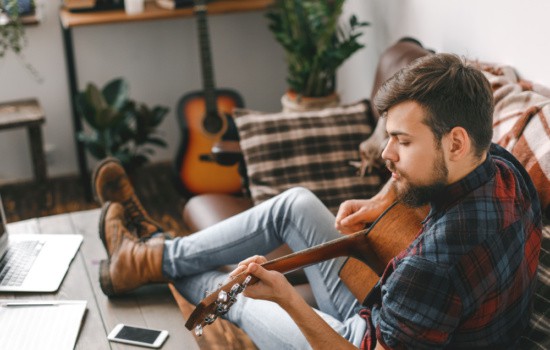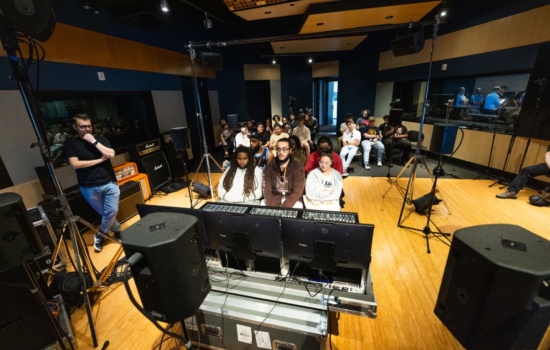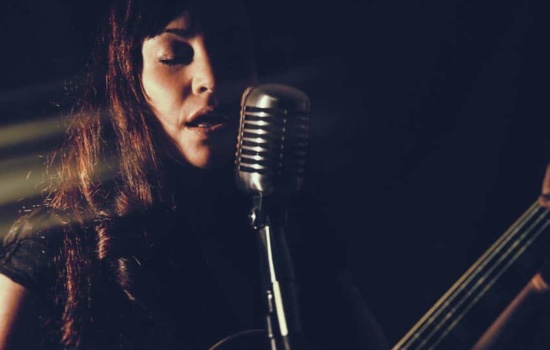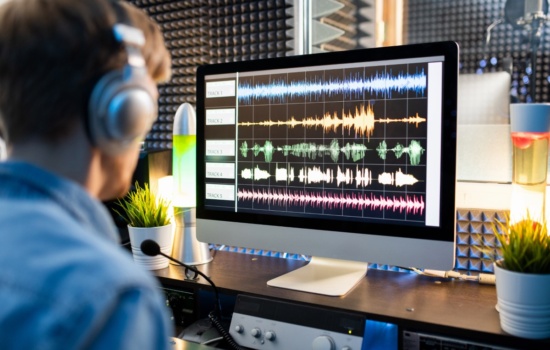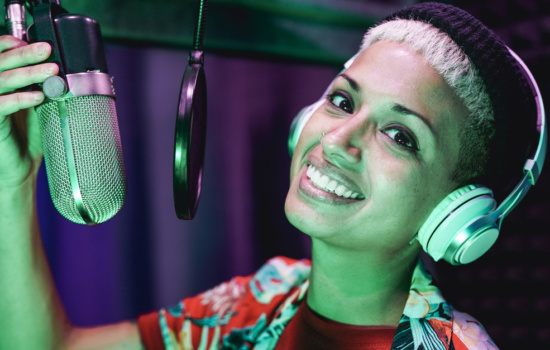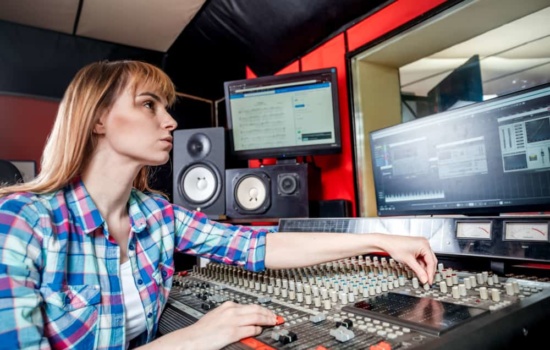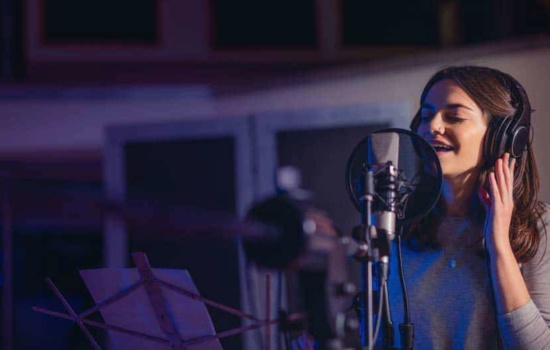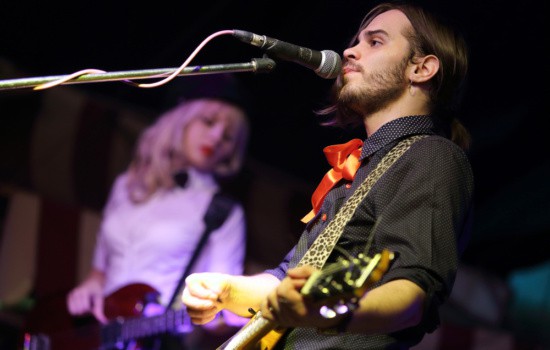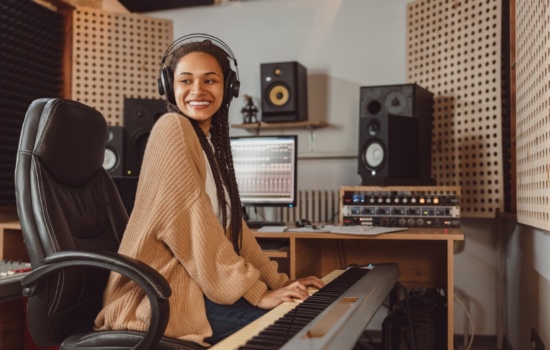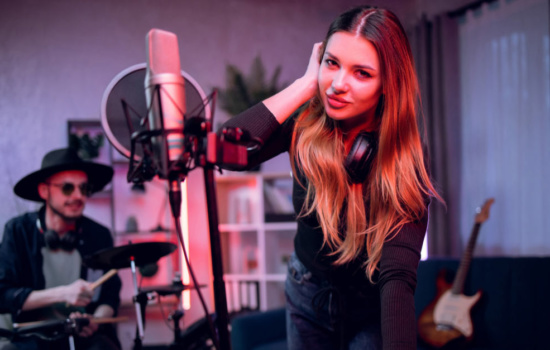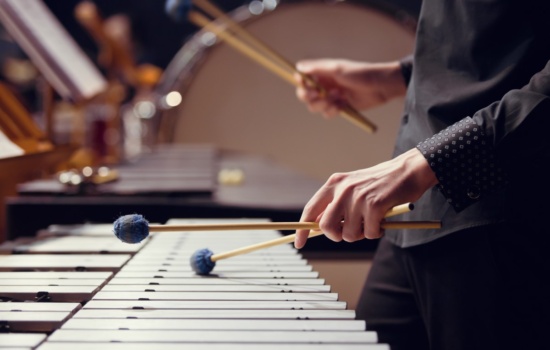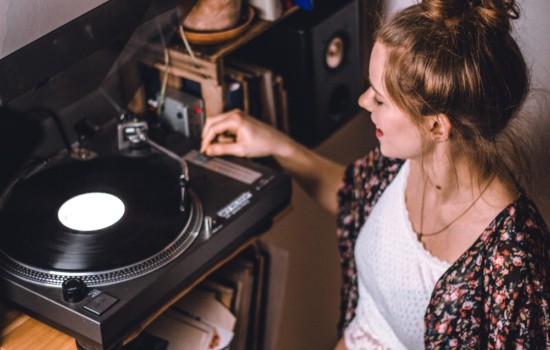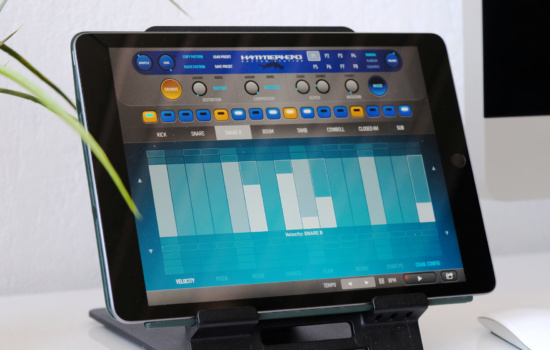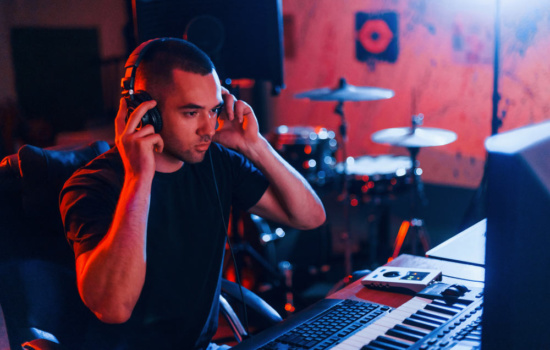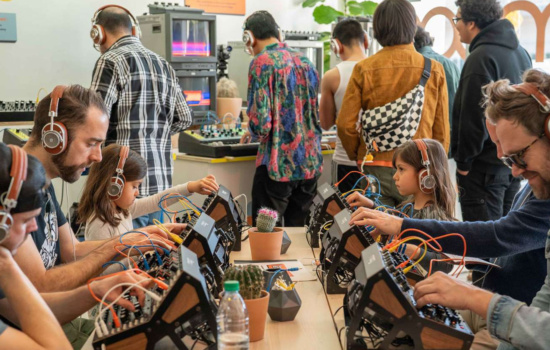Pianist
Career Overview
A Pianist is a musician who plays the piano and other keyboard instruments, providing harmonic, rhythmic, and melodic elements in music, whether playing solo or as part of an ensemble, band, or orchestra.
Alternate Titles
Piano Player, Keyboardist
Avg. Salary
$50,9341
Salary Range
$31K-$88K1

How To Become a Pianist
People also ask
Career Description
A Pianist is a musician and artist who performs in concerts and makes recordings, whether working alone or in an ensemble or orchestra. Sometimes called “Piano Players” or “Keyboardists,” especially in popular music styles, the Pianist provides chords, melodies, and bass lines and influences the dynamic and timbral range of a piece of music in overt and subtle ways. Pianists often travel the world performing in concerts, play with different orchestras or bands, work as a Session Player for recording projects, teach students, and compose music, write songs, or arrange and direct music in ensembles ranging from jazz bands to chamber groups to large orchestras.
It’s a demanding lifestyle and a very competitive career that requires a lot of hard work, stamina, and perseverance. Yet, successful Pianists universally speak of the love they have for playing the piano, and the satisfaction they get from an active professional career as a musician. Being a Pianist is the kind of career that allows one to travel, meet interesting people, form lifelong relationships, and collaborate with other highly talented and driven individuals.
In this piece, we’ll learn what it’s like to be a professional Pianist from the following artists:
- Kenny Broberg (Soloist, Finalist for the 2021 American Pianists Awards)
- Dominic Cheli (Soloist, Winner of the 2017 Music Academy of the West Concerto & Concert Artists Guild Competitions)
- Inna Faliks (Soloist, Professor of Piano and Head of Piano at UCLA)
What is a Piano Player called?
A Piano Player is also called a Pianist. Simply put, a Piano Player (Pianist) is someone who plays piano regularly and has at least a basic understanding of piano theory. A true Pianist actually knows how to play piano and isn’t someone who tinkers around until they find a few notes that sound good together.
Salary
The range of salary or income for Pianists varies widely, but a professional should be able to earn a decent middle-class wage. It depends to some degree where one lives, as there will be better and more opportunities in major urban centers, for example, than in a rural setting or small town. Many Pianists also teach, since piano lessons tend to be in high demand compared to some other instruments. A full-time working Pianist who performs and teaches could make anywhere from $50,000 a year up to several hundred thousand dollars, while the most famous Pianists can earn millions. There is a wide disparity in wage levels for professional Pianists.
Pianists are generally self-employed, even if they have a management team in place. There are few salaried positions for Pianists although they do exist at some orchestras and schools. Some Pianists find steady work as an Accompanist (or Collaborative Pianist) and may travel the concert circuit in that capacity. Other Pianists work as soloists, traveling and performing alone or as a featured artist with an orchestra or ensemble.
Some Pianists write their own songs and sing, or they may compose and arrange music for films, video games, or visual media, earning them royalties or flat fees. Some Pianists earn money performing at weddings, corporate events, nightclubs, or for other general business-type occasions. Pianists can become Booking Agents or Managers themselves, working to promote the careers of other musicians. There is a diversity of income sources, which means that a professional Pianist can cultivate and develop a regular stream of income from a wide variety of sources.
How much do Pianists make annually?
It varies. There are people that make a lot. Some artists make tens of thousands of dollars per concert, while others make only a few hundred. If you have a good Agent and you are well-known, you can demand a higher price. It also depends on how many concerts you’re doing and what kind of Agent you have. I’m kind of lucky because I did fairly well in competitions, and I have people that can help set my price. There are many great and deserving musicians who have not been this lucky.
It also depends on the market that you’re in. I was living in Houston, Texas. I’ve known Teachers there that were very good, very well respected, who lived in very rich neighborhoods and could charge $300 a lesson, $300 an hour. They could never charge that much in Kansas City, where I live now. Of course, that also comes with higher property values and so you gotta pay more. It’s like any other profession.
Professional Pianists’ salaries are extremely varied. You’ve got some people that are making seven figures. You’ve got some who are making six figures. I’d say generally, assuming they’re doing a variety of activities, a safe salary professional musicians can expect to make would be $50,000 at least. (For me, that means recording, teaching, performing, hosting a music education program.)
That’s a baseline for someone who’s doing all kinds of activities. If you’re limiting yourself to one avenue, then it would be lower, or it could be higher. But for someone who is resourceful at trying to embrace opportunities, I’d say $50,000 is pretty fair.
I will make a point of saying that the one benefit of music is, unlike in other professions, the older you get the more valuable you get. When you’re eighty-years-old, you’re actually more valuable than when you were twenty. At eighty, you have more experiences, more knowledge, and more content that you can share. People really want to learn from you.
That comes with age. People are more receptive at times to a more venerable grand artist than a no-name who no one knows. As an artist, you do appreciate in value as you gain experience.
In general, say yes to everything as a young person–if you’re compensated for it. Always inquire about that. Exposure doesn’t hack it anymore. You can get that for free on Instagram. As an artist, even if it’s just $100, you should expect some sort of compensation for your time.
If you’re saying yes to things, when you’re sixty, seventy, eighty, you’ll have that much more experience to draw on and use to your advantage. While in other professions it’s common to retire, in music it’s less common. I know plenty of people who are, by choice, still teaching and performing. Music is always a fun thing to share.
The reality is that I don’t know any musician who turned sixty-five and said they were done. They may say they’re not going to tour like they used to, or be practicing for hours and hours a day, but they’ll be teaching or doing activities that are easier on the body.
If you have that experience and you persevered and stuck around in this artistic world and braved it out, you’re definitely a valuable commodity that has appreciated with all that experience and knowledge.
A base salary of $50,000 can really skyrocket. There’s no point where the progress stops. It’s not all about money, of course, but it’s nice to know that you and your art appreciate as a commodity. It’s a different type of profession compared to sports, or business, or whatever, in terms of how artists develop.
Hey, what do you think about trying our new Music Career HelperMusic Career Helper really quick? It’s totally free and could help get your career moving fast! Give it a try. It’s totally free and you have nothing to lose.
Career Outlook
Like any career in the performing arts, becoming a successful Pianist takes years of hard work, dedication, persistence, and of course, some luck. Music, like sports, has a “winner take all” aspect to it, meaning that there are relatively few spots available at the very top.
That’s not to say that fame and success are always joined at the hip. There are plenty of hard-working musicians surviving just fine in the trenches. Whether working as a Cocktail Pianist, a Keyboardist in a rock group, or a Concert Pianist, there will always be a strong demand for talented Pianists who really know their stuff. Being able to play exceptionally well is certainly a prerequisite, and can take years to achieve, and taking care of the business side of things is also a must.
There’s an incredible variety of musical styles that call for piano, and the players who can cover many styles have the most opportunities to perform. On the other end of the spectrum, being the very best at any one style can also open doors to plenty of opportunities. The Pianists with the busiest schedules tend to be one or the other (single-style specialist versus versatile and fluent with many styles). Flexibility and excellence are the hallmarks of success, as in most careers.
Teaching is also a viable career path for the accomplished Pianist. There’s always a steady supply of students young and old who want to learn. The advantages of a teaching career are many, from having a steady source of income and a flexible schedule to do performances and tours, to the joy which manifests from sharing knowledge and seeing others learn and grow musically.
Some performers view teaching as a “fallback” or “plan B,” but the true teaching artist doesn’t look at it that way. Instead, one form of practice informs the other. The secret all great Teachers know is that they can also learn valuable lessons from their students and teaching others always leads the artist to reimagine their art form in new and interesting ways.
Whether at the top or the bottom of the ladder, there is always a next rung to reach for, and the dedicated music careerist understands that there is joy to be had in the constant learning as they watch their career unfold and blossom in new and unexpected ways. Loving what you do, in itself, will always enhance your career outlook as a musician, entertainer, or Teacher.
Is it hard to become a Professional Pianist?
It is as rare as the talent that comes along with the job. So, exceedingly hard. “Neuro-surgeon” hard. Or harder.
The actual life of traveling around all the time … it can get taxing. You spend a lot of nights in hotel rooms. For me, I’m younger, so I don’t see a ton of people my own age. There are definitely difficult things that come with that. I’ve developed new habits and hobbies because I’m alone a lot of the time.
So there’s that aspect of it. I really love being on stage and sharing that with people, and that helps. It can be a very stressful life, but it’s definitely got its upside. There’s a reason that I wanna do it.
There’s competition. I don’t think it’s particularly healthy, and in fact, I’ve chosen the schools I go to in part because there was a lack of that [versus] at some other, more famous schools. But there’s camaraderie, too. It’s kind of like a circuit. You see the same people at all the same stuff, and I’ve become friends with some of them.
Becoming a professional Pianist is definitely a unique path and it requires a lot of perseverance and love for what you do. A lot of times the danger in music is that we’re always comparing ourselves to others. The problem there is that in music, everything is subjective.
In sports when you compare yourselves to others, it’s pretty easy to say, “You’re faster than me so you’re better,” and that’s objective. While there are plenty of psychological issues that athletes deal with in sports, there’s still an acceptance of that black and white aspect. In music, just because someone plays faster doesn’t mean they’re better.
When you’re trying to make a career for yourself, you have to listen to as many voices as you can. That’s important. Play for lots of Teachers. Play for your friends and family. It’s always great to have tons of opinions. What you have to be strong about is sifting through those opinions in an objective way, and try and think about what actually speaks to you. Looking at your playing in an objective way and seeing what it needs.
Not every opinion is going to be good for you, but it’s still important to hear those opinions; to have the strength to discern what is beneficial to yourself. That’s one of the biggest things I see in really great students. They’re like sponges and they get lots of ideas, and they’re also good at figuring out which ideas work for them and which don’t. They want to think about these ideas and maybe transform them into something that makes sense for them.
The students I don’t see succeeding as much are the ones that are close-minded and don’t want to hear opinions. The reality is that as a student, you’re never going to be in super comfortable territory. Your entire life as a student is basically getting constructive criticism, comments, advice, “Do this,” or “Do that.” You’re dealing with people telling you what to fix, change, and do on a daily basis.
It’s always important to try and persevere and not be discouraged. Most people are trying to help you when they give you advice.
A student should also try and develop organizational skills early on. If someone sends you an email, try to respond within forty-eight hours. If a person can do that, it makes a huge difference going forward. That can be the difference between creating a relationship with someone or never getting to know them on a professional level.
Really being settled into who you are and not constantly comparing yourself to others is super important in music. And if you do compare yourself to others, at the very least, you have to say, “While I am comparing myself to someone else, I am in my own right unique and special and someone who has something to say that’s important.” Persevere through the psychological difficulties of a subjective lifestyle.
Career Path
Most Pianists start early and take private lessons from a local Teacher. They spend hours in the practice room learning the skills required to play the piano. Most young Pianists also learn to read music. Continuing with their studies throughout high school, most musicians go to college, though not always for music. Becoming an educated person, learning about all the art forms, studying history, and perhaps the sciences is considered an important part of any young artist’s education and career preparation.
If attending school for music, they will have the chance to get all the basics of how music works, such as music theory, arranging, composing, performance skills, while building repertoire and gaining experience playing in ensembles (groups) or the orchestra. They might also learn languages, study the music industry (music business), and study privately with a faculty master.
Some young musicians benefit from a relationship with a mentor; this is someone further along the career path who is not only willing to share knowledge and experience but will support the younger musician by providing opportunities coming through their own network. Often, the mentor will be a Teacher.
After years of practicing and preparing, and after graduating from college, or perhaps earning a graduate degree, the Pianist will then fully shift their focus to finding work. This can present challenges: since the musician is used to spending all their time studying and practicing, they must now turn fully to the business aspect of building a career. Most busy professionals report that they spend hours every day replying to emails, reviewing and executing contracts, working out complicated schedules, making travel arrangements, organizing and (re)learning repertoire, communicating with management at venues, coordinating with team members, and so on. Even if a Pianist is lucky enough to have a dedicated team, they are almost always self-employed and must watch the business very closely.
The same holds true for a teaching career. Busy Teachers must schedule their students, plan lessons and classes, constantly refine their teaching materials, collect payments, pay taxes…the list goes on and on. For most, it’s a long journey from being in school playing recitals, or small clubs, to being the featured artist on the concert stage. What may look like a “big break” to others is almost always the result of lots and lots of smaller breaks.
The most successful Pianists who stay in the game the longest have many skills beyond just playing music. They’ve learned to manage people, money, and their time. They say “it’s lonely at the top” but that is a fallacy to some degree. The most successful Pianists have a wide network of friends, tend to be social and outgoing if not gregarious, are well-respected, and know how to take care of themselves and the music. Being a Pianist is a career that most successful people wouldn’t trade for anything.
What do Professional Pianists do on a typical day?
Professional Pianists will practice for a few hours a day. But also, at the professional level, what ends up happening is the business side: an hour or two of emails, and then organizing documents. Planning programs, trying to plan events, talking to your Manager; a lot of the housework of responding to things.
People will be saying left and right, “Hey, send us this file,” or, “Hey, send us your bio,” or, “Can you send us some recordings for this?” or, “What do you think about these dates and are you available to record?” That can take a good several hours a day as well.
That’s the not-so-glamorous part of an average day that doesn’t include a concert. While some of us do have management teams that book concerts and stuff, the reality is that we are still self-employed. As a result, that means we really have to be in charge of ourselves and in charge of making sure that we schedule our activities in a sensible way.
Oftentimes as a self-employed person, your life can be very chaotic (in a good way), with some days involving three or four different activities. It could be teaching, recording, preparing for a concert, or maybe you’re doing an interview like this. Every day is a new experience, which is exciting and demands a level of organization.
It’s very different for a professional Pianist versus a student. When you’re a student, your day might be all practicing or going to class. When you’re a professional, things change. It’s still about the music, but answering emails becomes even more important sometimes because that’s the difference between getting a concert and not. You have to take care of yourself because you’re your own business.
[On performance dates], hopefully, you’re arriving at the venue at least a day before. God forbid you arrive the day of, but if it happens, so be it. For me, a concert day involves a few simple steps, because every venue, piano, and hall is different; you can’t expect consistency.
You’ll have an hour or two rehearsal in the hall in the early afternoon where you’ll try the piano and run through your program. Then, typically the Piano Technician will come in and tune the piano.
You’ll go home or to the hotel, where you’re starting to get ready. That might be mentally preparing and visualizing pieces in my head. Then the day of, taking a nice shower, getting to the hall an hour early, and then warming up backstage and playing the concert. That’s a pretty simple formula for a concert day.
Everyone has to think about what they want to do in terms of nutrition the day of, whether they eat a big lunch or big breakfast, or they like snacking little bits throughout the day. The butterflies people get throughout the day are different for everyone. For me personally, I like to eat relatively early on in the day and then not really have lunch, have some snacks, and then have a big dinner afterward. That’s typically my food situation.
Lots of water is encouraged. When you’re doing a high-pressure event, you end up sweating a lot and becoming dehydrated a lot faster. I always encourage my students and anyone who’s performing to drink a lot of water.
It’s kind of like being on an airplane; you get dehydrated on an airplane without really knowing it because you’re not sweating. This is similar. When your body is in a pressurized situation, your lips start getting dry and everything starts losing water. It’s good to make sure to hydrate.
The term “Professional Pianist” could mean many things. A classically trained professional Pianist’s life can be comprised of performances, travel, teaching, in many combinations.
A professional Pianist in the early career stages will be practicing at least 5-6 hours a day–probably beginning in early childhood. The commitment and discipline of a professional Pianist is far greater than many can imagine.
In addition to training the smallest muscles to follow the brain’s instructions, you are training your heart, your mind, your emotions. Being an artist, in any discipline, is a lifestyle that requires complete and utter dedication to the language of the art, be it dance, writing, theater, music, etc. Piano is no different.
This is the kind of a job that varies dramatically from person to person depending on how many concerts you have, what kind of concerts, or whether they’re solo or chamber. For me personally, the past year and a half has been a little different, but normally I try to practice for about five hours a day.
I use a timer religiously because I realized that I could be at school practicing from 12:00 to 8:00 and think I practiced for eight hours, and that’s not really true. I was really at the piano for four hours. It’s a way to keep myself honest. So, yeah, I practice for about five hours a day, especially before concerts.
Everybody’s different on the concert day. If you’re playing with an orchestra, a lot of times you’ll have a rehearsal in the morning of the concert and then play at night. Almost always, after the concert, you’ll have some sort of event that you have to go to, either with donors or whoever was sponsoring you—whoever’s in charge of the concert. It’s a lot of late nights.
Some people don’t even eat before they play because they’re worried about throwing up or something. But I always feel like I need to eat; I feel like I need energy.
Experience & Skills
Piano Players are like the ultimate musicians because the piano keyboard is like an orchestra in and of itself. The full range of orchestral pitches and timbres can be closely approximated by a skillful Pianist. Piano is also unique in that it is a percussion and a stringed instrument, with a mechanism of levers controlled by the keys.
The talented and skillful Pianist can manipulate and massage those keys to produce a wide range of musical sounds that no other instrument can match. Playing the piano well requires an acute awareness of sound and tone, dynamics and articulations, instrument and room acoustics, body posture, and more.
The piano is one of the most expressive instruments there is, and the keyboard can also be used as a controller for synthesizers and electronic instruments, expanding the palette even further. Most Piano Players read music, in both bass and treble clefs at the same time. The left hand plays the notes in the bass clef and the right hand plays the notes in the treble clef. (Some Organists use pedals and can read three separate systems simultaneously!) Being able to read both specific notes and also chord symbols is an important skill since the professional Pianist is often called on to read both.
Knowing how to read and accompany other musicians, i.e., Singers or instrumental soloists, is a very important and useful skill, as Pianists often work as Accompanists. Pianists must be able to look at sheet music and quickly understand the melody, harmony, and form of a piece. There may be a few Pianists who don’t read, but this is rare outside of blues or other “roots” music styles, and even most roots players can read. Knowing musical styles and being able to quickly memorize new music are other useful skills that experienced players bring.
Playing piano at a high level requires rhythmic acuity and “feel,” meaning that the Pianist must be able to lock into a good groove with the other players in a group, including (and especially) the soloists. Sometimes they play a little ahead or behind of the beat to create a sense of push or pull, respectively. This requires the ability to listen to the other musicians carefully and to blend their sound while providing the appropriate rhythms and harmonic context for the music at hand. As an Accompanist, they must know the parts of other soloists in order to adjust to any mistakes made, and to complement and support each group or soloist.
The Pianist should play in a way to provide exactly what the other players need to perform their parts, without adding too many extra embellishments, harmonic elements, or fills that might sound too “busy” and get in the way of the other musicians. It takes a lot of experience and technique to do this masterfully while also reading music and following a Conductor.
Working as an Accompanist or playing in bands aren’t the only opportunities available to Pianists. It’s not uncommon for Pianists to advance to Music Director or Bandleader. Their responsibilities may include hiring the musicians, choosing music for the group, writing arrangements, and conducting. Some Pianists can sing lead or background vocals. Singing is a valuable skill that typically leads to more opportunities and pay.
As with all the arts and professions, Pianists must have strong people skills. Working collaboratively as part of a team, taking leadership roles when needed, and being an effective communicator all contribute to a healthy career. Networking, contracting, managing projects, and leading groups are all business skills that come in handy for busy Pianists.
Knowing about the recording process and how to engineer and mix recordings (or at least what is possible) are also very useful skills for Piano Players. Connecting positively with others in the music business is an important skill that opens many doors and leads to success when combined with all the other abilities.
What skills do Pianists have?
Pianists can be loners just because they spend so many hours in a practice room. I always advise my students to be as creative, open-minded, flexible, social, hardworking, humorous, honest as possible. You need to understand and love other art forms, relate to many professions, know how to begin and see-through projects, know how to relate to people and help people, be socially aware, be politically savvy, well-read. Be a complete human before–or while–you try to be an artist.
Promoting yourself is pretty important. I don’t think I’m very good at it. I only post on social media once in a blue moon, but I wouldn’t recommend that at all because [social media] really does help.
It’s just a lot of discipline, doing the same thing every day. There’s that famous quote by the Conductor Wilhelm Furtwängler: “There’s no enemy of the musician other than a routine.” For me, a routine is a great thing. It’s not an easy life. I work pretty much all day. So you have to really want to do it.
The number one skill is flexibility. Flexibility, adaptability. Being an open person is so important. In the professional Pianist lifestyle, you have to be open to playing all kinds of music. You have to be open to working with all kinds of people.
For example, you plan a concert and you’re happy about that, but then maybe a presenter says they want you to change the program. Maybe in your mind you think that’s unreasonable. Stop and ask yourself the question, “Is it? Can I make it work?” Think about whether you can compromise.
When you’re playing music with an orchestra or small chamber group, that’s an opportunity where you have to be listening and open to new ideas. Understanding when it’s your time to follow and when it’s your time to lead. Being a sponge. Really being sensitive to your environment. Again, when you’re playing solo you can kind of do what you want, but when you’re doing ensemble work, you have to be very flexible.
Being open to any kind of opportunity is also very important. If someone says, “Hey, you’re a Pianist but today we want you to host a podcast,” or something … that’s a very different type of thing. You’re not actually playing at this point, but you’re performing with your vocabulary and words and whatever. That’s a different type of experience, but it’s an opportunity.
Maybe it’s someone saying, “We want you to record this music,” but it’s not classical; it’s a different style from what you usually play. You need to ask yourself if it’s something you can do, and the answer should be yes. And if it seems artistically satisfying to you, then you do it.
There are all sorts of experiences that don’t fall into the cookie-cutter model of Mozart and Beethoven and that stuff. There’s a whole wide world of experiences and art, and I would say that sometimes when you’re approached with a project, maybe your preconceived notions will say, “I don’t want to do that,” but then you might think about it and say, “Well it does seem interesting, and it’s a new experience.”
It’s happened to me plenty of times. I’ve done something I didn’t think I would enjoy, but I really, really enjoyed it.
So my biggest piece of advice for musicians is to be very flexible, open, and willing to at least consider anything that comes their way in terms of opportunities and projects. I guarantee people will be surprised when they at least try something. They will discover they’re talented at this or have a knack for something they never knew.
When you’re closed-minded and don’t want to try new experiences, you never really find that out. Sure, it can be scary going into the unknown, but it’s part of being an entertainer and an artist. Having that courage to try, and the confidence to say, “If I’m in a situation I’m not comfortable in, I can figure it out. I can make it work.”
The other piece of advice I have on a practical level is being organized in terms of what you have coming up. Make sure to write down all the concerts, activities, or just goals you have. Write them down on paper so you can actually see what’s coming up in front of you. When we have things in our heads, our memories can’t always keep on top of the commitments we have. It’s good to have a list and be able to say, “Okay, two months out from this … three months out from this …” etc. That way you can prioritize what needs to happen today.
Sometimes, performing music might be the most stressful thing for you, but it’s not the most pressing thing because it’s happening in six months. If something is happening sooner, you should look at that. Having that organizational sense when working with a lot of eclectic activities really keeps you in check and on top of things. Unless you have someone who is taking care of every aspect of your life, it’s expected for you to be prepared. And preparation comes from organization on some level.
When you’re young as a Pianist, try to practice a lot and hone your skills. Especially if you’re under the age of twenty-five, really try to play music that you’re not good at. Try to embrace pieces, avenues of your art, that you really aren’t good at. When you’re that young, it’s important to make mistakes. When you’re older, then you learn from these mistakes.
A lot of people love just doing what they’re good at. We all do. We love being comfortable, happy, and feeling good about ourselves. The reality is, when you’re young–especially in your teenage years and or undergraduate years of college–it’s much better [to play music that you’re not good at]. If there’s a Composer that bothers you or that you can’t wrap your fingers around, go for that and dive into it. Embrace the pain, so to speak, that might come from not sounding good.
Not everything is going to be your cup of tea. At least be able to understand that and say, “This isn’t my style, but I understand what I need to do to make it work.” When you’re young, you can make mistakes and they aren’t as severe as when you’re a professional and playing with orchestras. At that point, you’re expected to produce and not be completely clueless.
It’s really important as a young person to try everything. That goes back to my idea of being flexible and open; embracing all experiences, good and bad. The bad ones you learn from the most.
I’ve noticed that the people who have the most bad experiences try to learn from them, and they’re the ones I admire the most. Those are also the ones that advance the farthest. They’ve been through so much and developed this tough skin and confidence. They know they can persevere. And indeed, because of that, they do get better and conquer their fears and weaknesses … even if they’re not comfortable.
Education & Training
Most Pianists start playing at an early age, studying with a Private Teacher. They learn proper playing technique and posture and learn to read using both hands in bass and treble clefs. Whether or not they study with a Teacher, they will steadily improve their ability by using books and videos and through countless hours of practice.
Beyond private lessons, during the high school years, some Pianists might choose to attend a summer program or a music camp, and they might enter piano competitions. Many young Pianists also play with their school orchestra, in chamber groups, in the school’s jazz band, or with a rock band outside of school. All these activities serve to help improve performance ability and teach the student to work collaboratively with others on creating good music.
For schooling, the next step could be to study at a conservatory, college, or university to earn a music degree. Not all Pianists attend music school, but college is a great place to improve music skills and meet other musicians who will help shape a future career. In college, Pianists build on their knowledge of music theory, study arranging, practice solfege, and learn to use music technology and music software. They study music history, counterpoint, and other traditional music subjects. They participate in ensembles and labs, and study privately with a faculty Pianist.
If earning a bachelor’s degree, they will take liberal arts courses in literature, hard and soft sciences, world history, mathematics, or business. Tackling liberal arts and business courses provides for a broader education and helps prepare graduates for fulfilling careers as musicians. Students in most college programs have choices of majors and minors as well. For example, Pianists could choose to major in film scoring, music production, songwriting, or music business. Some programs allow students to complete dual majors or design their own major concentrate.
Student Pianists may choose to continue their studies in graduate school, where they focus on performance, composition, music technology, or music education. This is a smart idea, especially if they intend to teach one day. Many professional Pianists do teach, and a graduate degree is one of the best ways to prepare for a career as an educator.
Not all jobs in the music industry involve playing, and some Pianists work in music-related roles to get a foot in the door of the music business. Working in the music industry is always a good way to learn more and expand your network at the same time.
Becoming a professional Pianist requires a dedication to the art and craft of performing, as well as lifelong learning. Reading biographies of famous Pianists and Composers and studying what they did is a good way to get information, ideas, and inspiration.
Attending live concerts should also be part of a Pianist’s training. Studying with a top piano pro can open the door to working opportunities of all kinds.
Becoming the best Pianist you can possibly be, doing the music right, being reliable, on-time, and easy to work with will always lead to more and better opportunities to show your stuff at the piano. Eventually, the word will get around that you have what it takes, and you will become busier and more in-demand as a Pianist.
Do you need a degree to be a Pianist?
No, but it helps to have a degree when securing teaching positions–and the higher training you receive not only hones your artistry with the best professionals in the field, but allows you to make connections, bonds, friendships that will come in very necessary in the music world later on.
Well, yes and no. It depends on what you wanna do. It’s more like, “How many degrees?” If you wanna teach at a university, normally you need a doctorate. I’m lucky enough that I don’t need that because of all the other things that I’ve done.
You absolutely need to have training. That’s the main thing. Pretty much everybody in our field goes to college and does that. But the most important thing is finding the right Teacher. It’s not about what school you go to.
No, they don’t. Not at all. That’s a misconception. I know plenty of extremely good Pianists who have business degrees, science degrees, or something completely unrelated to music. The only benefit of a music degree is that on a basic level, you’re forced to learn all the fundamentals.
That’s something I believe everyone should learn. Classic, pop, rock, etc. You should learn and understand the history and the context of what you’re doing. Without a music degree, you have to have that impetus to seek out that information for yourself. If you go to college for music, it’s required. It’s a given that you’ll know these basic fundamentals.
But you really don’t need a degree to be considered an artist or worthwhile. Sure, like anything on a resume, it can look good. The reality is that if you’re someone who understands how to communicate with people with your playing or your talking–or maybe with your social media presence–that’s what matters in the long run.
It’s that communication and talent for storytelling and creating an experience. You can go to a million schools, but if you don’t have that, it doesn’t matter. What matters the most is how a person is able to share what they love, share their art, and share their music with the audience and engage the audience.
What else do you think people need to know if they want to start a career as a Pianist?
The main thing is you really have to love it because it’s not an easy way to make a living. It’s more of a vocation, you know? You have to believe that this is really what you’re meant to do, because it requires a lot more discipline and a lot more giving of yourself and of your time than many other professions.
But it’s absolutely worth it. I felt like this is what I’ve always wanted to do and that I wouldn’t really be happy doing anything else. So it was the right decision for me.
Fun Facts
Who is a famous Piano Player?
The most famous Piano Players include Wolfgang Amadeus Mozart, Ludwig van Beethoven, Frédéric Chopin, and Johann Sebastian Bach. These Pianists lived in the 1600s, 1700s, and 1800s. Famous Piano Players in modern music include Elton John, Billy Joel, Herbie Hancock, Stevie Wonder, Robert Glasper, Jon Batiste, and Cory Henry, just to name a few.
Who is the no. 1 Pianist in the world?
It’s difficult to say who the best Pianist of all time is because there are so many different types of piano music and different styles of play.
But here are some of the best Pianists, based solely on skill level, not fame:
- Leif Ove Andsnes
- Martha Argerich
- Alfred Brendel
- Frédéric Chopin
- Claudio Arrau
- Vladimir Ashkenazy
Sources
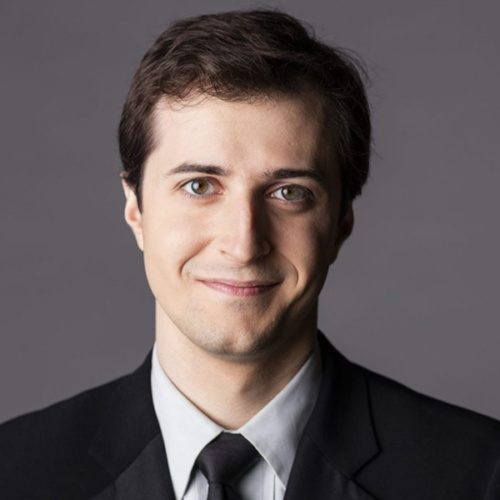
Kenny Broberg
American Pianist Kenny Broberg continues to build a reputation as “one of the most intelligent and intense artists on the concert stage today” (Theater Jones) with fresh interpretations complemented by a natural, honest stage presence. The Minneapolis native first came to international attention when he captured the silver medal at the 2017 Van Cliburn International Piano Competition with performances marked by “an imaginative shaping of themes, revelation of inner voices, and an unfailing sense of momentum” (Texas Classical Review). He followed this with a bronze medal win at the 2019 International Tchaikovsky Competition, adding to previous prizes at the Hastings, Sydney, Seattle, and New Orleans International Piano Competitions.
Kenny has performed across Europe, Asia, Australia, and North America, and worked with such esteemed Conductors as Ludovic Morlot, Kent Nagano, Leonard Slatkin, Vasily Petrenko, Nicholas Milton, John Storgårds, Carlos Miguel Prieto, and Stilian Kirov. He has collaborated with the Royal Philharmonic, Minnesota, Kansas City Symphony, Sydney Symphony, Seattle Symphony, Fort Worth Symphony, and the Louisiana Philharmonic Orchestras, among others.
Lauded for “the ability to build a strikingly imaginative and intelligent program… [leading] his audience through a superbly conceived, brilliantly executed journey” (Theater Jones), Kenny enjoys juxtaposing the novel and familiar, bringing light to lesser-known works alongside classic repertoire. Recent and upcoming highlights include his Spivey Hall debut; a tour of rural Australian communities, along with a return to Sydney; residencies at the Mariinsky International Piano, Stars on the Baikal, Strings, and Sunriver Music Festivals; and recitals in Yokohama, Nagoya, Moscow, New York, and Los Angeles.
He has been featured on NPR, WQXR, APM’s Performance Today, MPR, and ABC (Australia) radio. In 2019, Kenny appeared at the Texas Medal of Arts Awards Gala, performing for honorees including Matthew McConaughey and Jennifer Holliday; he is also a finalist for the 2021 American Pianists Awards. Several of his performances at the 2016 Sydney International Piano Competition were included on CDs released on the Universal Music Australia label. His solo debut album was released in August 2017 on the Decca Gold label, featuring one of his signature pieces, the Barber Piano Sonata, as well as works by Bach, Schubert, Chopin, and Franck.
The first musician in his family, Kenny started piano lessons at age 6, when he was first fascinated by his mother’s upright–a wedding gift from her parents. He studied for nine years with Dr. Joseph Zins before entering the University of Houston’s Moores School of Music, where he earned a Bachelor of Music degree with Nancy Weems in 2016. He currently resides in Kansas City, Missouri, where he continues to be mentored by 2001 Cliburn Gold Medalist Stanislav Ioudenitch at the International Center for Music at Park University. Alongside his teachers, he is influenced by the recordings of Alfred Cortot, William Kapell, and Claudio Arrau.
A hockey and baseball athlete in high school, Kenny enjoys watching and playing sports; he’s even known to catch a livestream of a game while warming up for a performance.

Dominic Cheli
Dominic Cheli’s playing has been described as “spontaneous yet perfect, the best of how a young person can play.” (Symphony Magazine) His rapidly advancing career included his Walt Disney Concert Hall Debut with legendary Conductor Valery Gergiev where Dominic was described as “mesmerizing, (he) transfixed the audience…his fingers were one with each key.” (LA Times) He gave his Carnegie Hall Recital Debut this past season, and recently recorded his second CD on the Naxos label of the music of Liszt/Schubert. In July 2017, Cheli’s first CD, featuring the music of Muzio Clementi and released by Naxos, was hailed as “definitive performances, that match splendid playing with an appreciation of Clementi’s diverse, classically based style.” Also in 2017, Dominic was named 1st prize winner of the Concert Artists Guild Competition in New York City.
Winner of the 2017 Music Academy of the West Concerto Competition, Dominic performed Prokofiev’s 2nd Piano concerto with Conductor, Composer, and MacArthur “Genius Grant” recipient, Matthew Aucoin. Described as a “barnstorming Goliath” Mr. Cheli’s performance of Prokofiev’s 2nd concerto “roared like a locomotive, shot firebrands of energy this way and that, while the piano strained to keep in one piece under the thrall of Cheli’s glorious technique.” (Santa Barbara Voice Magazine)
A native of St. Louis, Dominic has performed with the Metropolitan Orchestra of St. Louis, as well as orchestras all across the country and abroad including the San Diego Symphony, DuPage Symphony, Columbus Symphony, Princeton Symphony, Colburn Orchestra, Virginia Symphony, Adrian Symphony, Nordwestdeutsche Philharmonie (Germany), and the Great Falls Symphony. He has worked with Conductors such as Valery Gergiev, Yaniv Dinur, Markus Huber, Rossen Milanov, Arthur Fagen, Bruce Kiesling, Matthew Aucoin, and many others. Dominic recently debuted at several major festivals across the United States including the Ravinia Festival, Mostly Mozart Festival, and the Virginia Arts Festival. Upcoming engagements included appearances with the Seattle Symphony, a re-invitation to the Ravinia Festival, his debut at Alice Tully Hall, and recitals in Philadelphia, Washington D.C, and New York City.
Committed to engaging with his surrounding community, Dominic regularly performs at high schools, retirement homes, and gives both masterclasses and lectures for his younger audiences. Upon invitation, he has performed with Paul Coletti at ViolaFest in Los Angeles for younger students, and “Baby Got Bach” with Pianist Orli Shaham at Le Poisson Rouge in NYC. Dominic has performed as an artist for Project: Music Heals Us, a non-profit organization that presents interactive classical music performances to diverse audiences in order to provide encouragement, education, and healing with a focus on elderly, disabled, rehabilitating, incarcerated, and homeless populations.
In 2018, Dominic was invited by his mentor, Andre-Michel Schub, to perform at the Virginia Arts Festival, both as a soloist and collaborator, in concerts centered around the music of Mozart. They collaborated in Mozart’s Double and Triple Piano Concertos with the Virginia Symphony, as well as in recital where “Cheli delivered one brilliant performance…it was a dazzling moment by a pianist whose name is destined for Schub-ian heights.” (Virginia Gazette) Mr. Cheli has studied at the Manhattan School of Music, Yale University, and the Colburn School. Andre-Michel Schub, Peter Frankl, Fabio Bidini, Zena Ilyashov, and Sylvia Rosenberg are individuals who have been especially influential on his development as an artist.
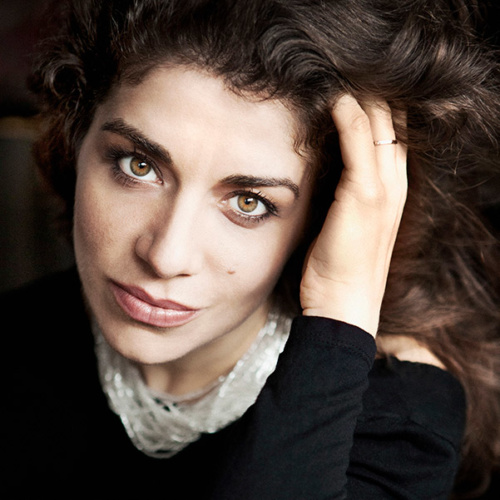
Inna Faliks
“Adventurous and passionate” (The New Yorker)
Ukrainian-born American Pianist Inna Faliks has made a name for herself through her commanding performances of standard piano repertoire, as well as genre-bending interdisciplinary projects, and inquisitive work with contemporary Composers. After her acclaimed teenage debuts at the Gilmore Festival and with the Chicago Symphony Orchestra, she has performed on many of the world’s great stages, with numerous orchestras and in solo appearances. Faliks is currently Professor of Piano and Head of Piano at UCLA.
Critics praise her “courage to take risks, expressive intensity and technical perfection” (General Anzeiger, Bonn), “remarkable insight” (Audiophile audition) “poetry and panoramic vision” (Washington Post), “riveting passion, playfulness” (Baltimore Sun) and “signature blend of lithe grace and raw power” (Lucid Culture). Her October 2014 all-Beethoven CD release on MSR classics drew rave reviews: the disc’s preview on WTTW called Faliks “High priestess of the piano, concert pianist of the highest order, as dramatic and subtle as a great stage actor.” Her previous, critically acclaimed CD on MSR Classics, Sound of Verse, was released in 2009, featuring the music of Boris Pasternak, Rachmaninoff and Ravel. Her discography also includes a recital recording for the Yamaha Disklavier label, Chopin solo and cello sonatas recording with Cellist Wendy Warner, “Polonaise-Fantasie, Story of a Pianist” for Delos – an autobiographical monologue-recital of short piano works from Bach and Chopin to Gershwin and Carter.
Highlights of the recent seasons include performances in Ravinia Festival and the National Gallery in DC, recital tours of China, with appearances in all the major halls such as Beijing Center for Performing Arts, Shanghai Oriental Arts Theater and Tianjin Grand Theater, as well as acclaimed performances at the Festival Intenacional de Piano in Mexico, in the Fazioli Series in Italy and in Israel’s Tel Aviv Museum, at Portland Piano Festival and with the Camerata Pacifica, with the modern dance troupe Bodytraffic at the Broad Stage Santa Monica, and Jacaranda Series in Los Angeles, where she performed Rzewski’s The People United Will Never Be Defeated.
Faliks has been featured on WQXR, WNYC, WFMT and many international television broadcasts, and has performed in many other major venues, such as Carnegie Hall’s Weill Concert Hall, Metropolitan Museum of Art, Paris’ Salle Cortot, Chicago’s Symphony Center, Moscow’s Tchaikovsky Hall and in many important festivals such as Verbier, Newport, Portland International, Music in the Mountains, Mondo Musica Cremona, Brevard, Taos, International Keyboard Festival in NYC, Bargemusic, and Chautauqua. She is regularly engaged as a concerto soloist nation-wide.
Faliks is the founder and curator of the of the Manhattan Arts Council award winning poetry-music series Music/Words, creating performances in collaboration with distinguished poets. This has been described as “surreal, impactful, and relevant” (Lucid Culture). Her long-standing relationship with WFMT radio has led to multiple broadcasts of Music/Words, which she had produced alongside some of the nation’s most recognized poets in performances throughout the United States.
An artist known for his versatility, Faliks is equally at home with standard repertoire, rare and new music, and interdisciplinary performances. She recently co-starred with Downton Abbey star Lesley Nicol in “Admission – One Shilling,” a play for Pianist and Actor about the life of Dame Myra Hess, the great British Pianist. Most recently, she is touring with her autobiographical recital-monologue, “Polonaise-Fantasie, the Story of a Pianist” throughout the US and Canada.
Constantly in dialogue with today’s Composers, she has had works composed for her by Timo Andres, Billy Childs, Richard Danielpour, Paola Prestini, Ljova, Clarice Assad, Peter Golub, and many more. She was the winner of many prestigious competitions, including Hilton Head International Piano Competition and International Pro Musicis Award.
Faliks is internationally in demand as an Artist Teacher, and frequently adjudicates competitions gives masterclasses and travels to Artist Residencies in major conservatories and universities around the world. In March 2019, Faliks was Artistic Director of Classical Music for YoungArts LA, programming and workshopping a program with the nation’s top young musicians and Composers, as well as directing a number of panels and masterclasses. As a Writer, she has been published by LA Times and Washington Post.
Inna Faliks is a Yamaha Artist.
Photo Credit: Lisa Marie Mazzucco
